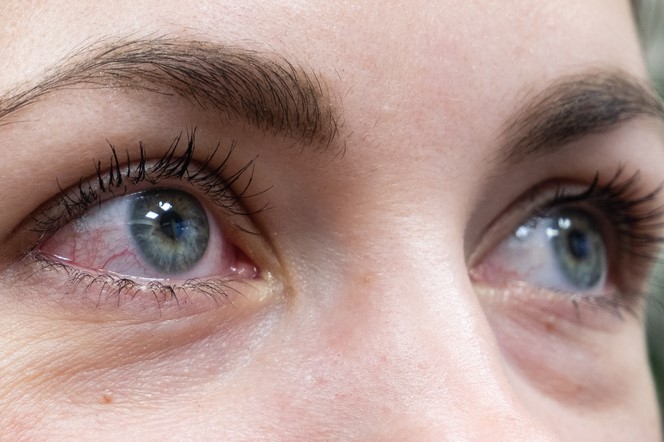
Between allergies, lack of sleep or just plain exhaustion from looking at a screen all day, it’s hard to avoid tired-looking, red eyes.
While redness-reducing eye drops may be your go-to source for soothing relief, you may actually be doing more harm than good. In fact, many studies have shown that redness-reducing eye drops only treat the symptoms of bloodshot eyes by constricting the blood vessels making them less visible. Over time, using these eye drops too frequently can cause your eyes to develop a dependency, which may cause blood vessel swelling to worsen.
So, instead of reaching for redness-reducing eye drops as often as you do lip balm, here are some alternative ways to reduce eye redness.
Use artificial tears instead.
Oftentimes, red eyes are simply the result of dryness and can be relieved through the application of moisture rather than medicated drops. Artificial tears provide a safer way to lubricate your eyes, especially when they are preservative-free. Preservative-free artificial tears often come in the form of small plastic vials. Bottled artificial tears can contain harmful preservatives in them and should be used sparingly.
Take a break from screens.
When you stare at screens for extended periods of time, there is a tendency to blink less which only leads to dryness and strain. When working or staring at screens for extended periods, be sure to take small breaks to avoid overstressing your eyes. We recommend the 20-20-20 rule: every 20 minutes spent looking at a screen, you should look at something 20 feet away for 20 seconds. This will give your eyes the break you need to return to your screen.
Try using a humidifier.
Again, dryness is often the primary culprit when it comes to red eyes. Whether your eyes are taking a beating from the warm, summer air or the dry, winter air, humidifiers can go a long way in keeping your eyes hydrated and free from irritation.
Drink more water.
When your body is dehydrated, water content throughout the body decreases dramatically. Of course, the eyes are one of the first places affected. While bloodshot eyes may be the least of your concerns when you’re dehydrated, proper water intake can go a long way in preventing irritated eyes.
Apply warm compresses and clean the eyelids.
Blepharitis, or eyelid inflammation, is often a cause of dry eye. Meibomian (oil) glands along the surface of your eyelid can get clogged and inflammatory material can build up inside. Using warm compresses can liquefy the inflamed material and allow the glands to express the normal oil. Cleaning the eyelid margin with baby shampoo or an eyelid cleanser can also help remove debris and bacteria that cause inflammation.
Check your medications.
Sometimes red eyes can actually be a side effect of certain medications. While this may be the case for some prescriptions used to treat chronic conditions, the most common cause is over-the-counter antihistamines and cold medicines. These medications work to dry out the sinuses which can often result in dry, irritated eyes.
Still struggling to find redness relief?
More often than not, red eyes are simply the result of common irritants that many people experience on a daily basis. Whether it’s allergies, seasonal dryness or strain, we’ve all experienced red, tired eyes. But, this doesn’t make it any less of a nuisance.
So, if you find yourself reaching for drops daily, it may be a sign of an underlying condition, severe allergies or an infection. That’s why the experts of Atlanta Ophthalmology Associates are prepared to help. With a wide variety of services, up-to-date technology and the latest treatment options, your eyes can finally find the lasting relief they need.

